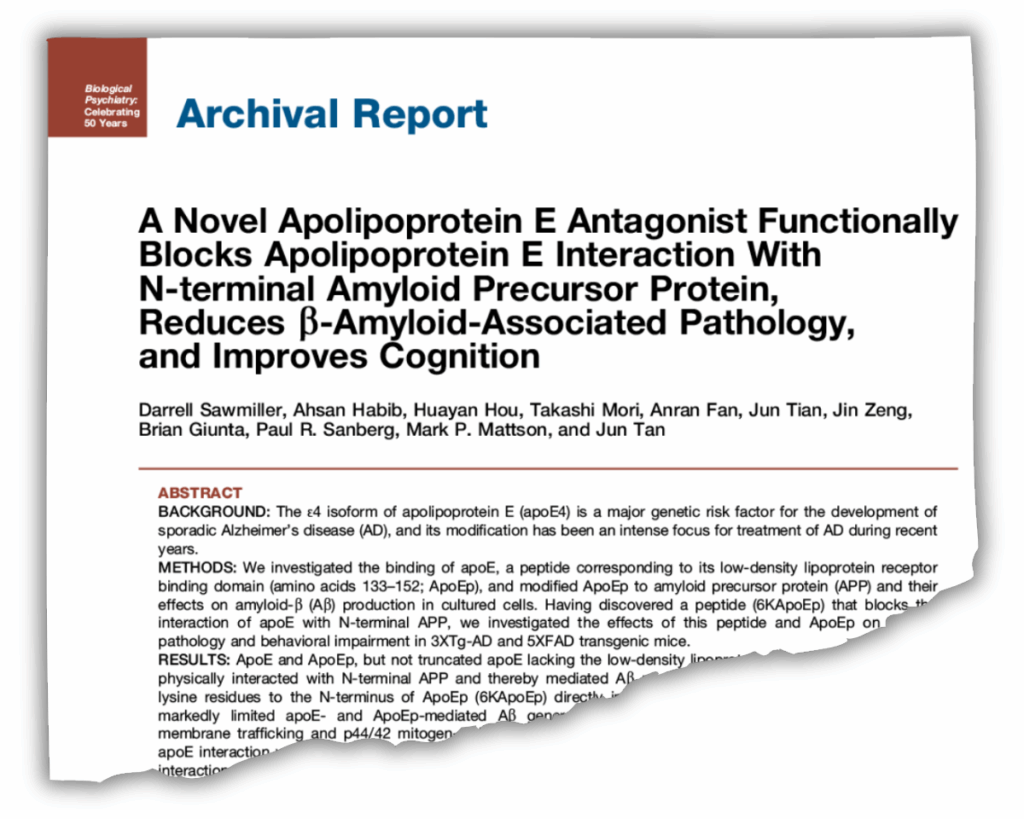A journal says it will retract a 2019 paper on an Alzheimer’s treatment after an institutional investigation found research misconduct, according to emails seen by Retraction Watch. The move comes four years after another investigation by the same university uncovered image duplication in a different paper by a similar group of authors.
The paper, published in Biological Psychiatry, describes the potential of an apoE antagonist for treatment in Alzheimer’s disease.
A 2019 news release by the University of South Florida, home to several of the researchers involved in the study, called the work “promising.” Lead author Darrell Sawmiller, an assistant professor at USF, said the study represented “the first time … we have direct evidence” apoE “acts as an essential molecule” in the mechanisms leading to Alzheimer’s.
The paper has been cited 32 times, according to Clarivate’s Web of Science. Jun Tan, the corresponding author on the paper, is no longer with USF but was formerly the Robert A. Silver Chair in Developmental Neurobiology at the university. His most recent publication lists dual affiliations with institutions in China.
We have asked the university for the investigation but have not received a reply.
Tan was one of several dozen researchers who study Alzheimer’s disease whose papers had been questioned on PubPeer and described in investigative journalist Charles Piller’s recent book, Doctored. According to the book, Tan “did not respond to queries about apparent image doctoring in fifteen studies — many concerning amyloid-beta in animal testing.”
The article marks the second retraction for Sawmiller, Tan, and several other common authors. The first was a 2017 paper in Cell Death and Disease. A USF investigation into that work found “inappropriately duplicated images” and that the “text associated with them are not scientifically defensible,” the December 2021 notice says. The paper, which describes lithium’s potential as a treatment for Alzheimer’s, has been cited 21 times.
Sleuth Kevin Patrick raised concerns about the Biological Psychiatry paper on PubPeer in October 2021. One of the images in the paper “seems to be duplicated … although the brightness is slightly different, suggesting that this isn’t merely due to an error during figure assembly,” Patrick wrote under his known pseudonym “Actinopolyspora biskrensis.”
Patrick sent the PubPeer comment to the journal that same month. Editor Rhiannon Bugno told Patrick in January of this year the journal had “continued to regularly follow up with the institution.” Bugno also wrote the university told her the “investigation itself was concluded,” but USF “has yet to share any information/findings from the investigation with us.” She followed up in a later email saying the journal was “considering whether to take any action in the interim.”
On September 16, Bugno told Patrick in an email USF “has informed us that research misconduct was identified. Therefore, we are retracting the paper.” Bugno did not reply to our email asking when the journal plans to issue the retraction.
During Tan’s tenure at USF, he was the principal investigator on over $6 million in grants from the National Institutes of Health, according to NIH RePORTER.
Tim Kersjes, head of research integrity, resolutions, at Springer Nature, told us the investigation into the Cell Death and Disease paper was initiated by comments on PubPeer, but USF reached out while the investigation was in progress to recommend retraction.
Patrick had also flagged that paper on PubPeer, noting in a 2019 comment two parts of a figure which “appear to include multiple areas of overlap.” In 2021, after the article was retracted, Patrick wrote on PubPeer the concerning images “seem to originate from the Ph.D. thesis of the first author,” Ahsan Habib. Habib earned his doctorate from USF in 2018 and is an author on both the Cell Death and Disease and Biological Psychiatry papers. His LinkedIn profile says he is currently a lab tech at food company HP Hood LLC and was formerly a postdoctoral fellow at the National Institute on Aging.
Habib did not respond to our request for comment to his professional and personal emails. We also reached out to Takashi Mori, another common coauthor currently a researcher at Gifu University in Japan, who did not respond to our request for comment. Both disagreed with the retraction in Cell Death and Disease, according to the notice.
Sawmiller also did not respond to our request for comment.
Sawmiller, Tan, and Habib, as well as other shared authors on the two papers, received two expressions of concern from Sage’s Cell Transplantation in 2022. One, on a paper published in 2015, was issued after Patrick’s PubPeer comment pointed out “unexpected” image duplication. A coauthor on that paper was Paul Sanberg, who, as we reported at the time, was co-editor-in-chief of Cell Transplantation and had financial ties to the work, neither of which were disclosed in the conflict of interest section.
Sanberg, executive director of USF’s Center of Excellence for Aging, is also a coauthor on the soon-to-be-retracted paper in Biological Psychiatry.
The second expression of concern in Cell Transplantation, for a paper published in 2018, came shortly after the first and followed Patrick’s PubPeer comments pointing out a splice in one of the figures.
Tan was the corresponding author for all four of the papers and, according to all the notices, didn’t respond to the journals’ inquiries. The Cell Transplantation notices state the “remaining authors noted that the corresponding author has access to all of the data underlying the findings.” Tan did not respond to our multiple requests for comment to several email addresses under his current affiliations.
Several of Tan’s other papers have been flagged on PubPeer for image issues, including a second paper from Cell Death and Disease, which Springer Nature has confirmed they are now investigating.
Like Retraction Watch? You can make a tax-deductible contribution to support our work, follow us on X or Bluesky, like us on Facebook, follow us on LinkedIn, add us to your RSS reader, or subscribe to our daily digest. If you find a retraction that’s not in our database, you can let us know here. For comments or feedback, email us at [email protected].


Retraction published November 3, 2025 h/t anon Hoya.
https://www.biologicalpsychiatryjournal.com/article/S0006-3223(25)01541-0/fulltext